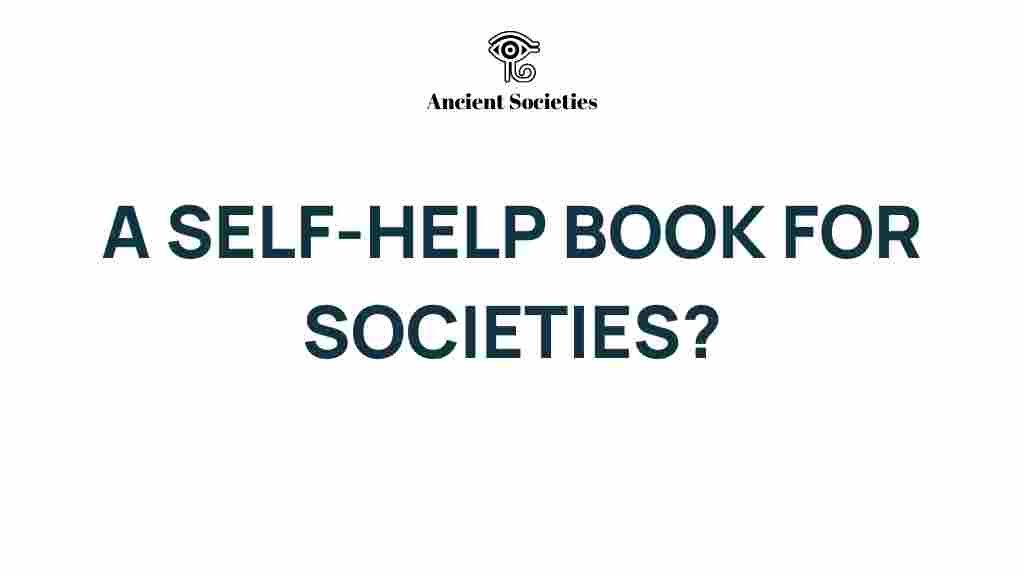Can Societies Benefit from Self-Help Principles?
The concept of self-help has long been associated with personal development and individual empowerment. However, the principles of self-help extend beyond the individual and can significantly impact societies. By fostering community growth, enhancing social dynamics, and promoting collective action, self-help principles can lead to cultural transformation. This article explores how societies can benefit from self-help principles, providing insights into the methodologies, challenges, and transformative effects of these practices.
The Importance of Self-Help in Societal Context
Self-help is often perceived as a personal journey. Yet, when applied at a community level, it can catalyze significant social change. Here are some key reasons why self-help principles are essential for societal progress:
- Empowerment: Self-help encourages individuals to take control of their lives, leading to a more empowered populace that can initiate positive change.
- Collective Action: When individuals come together to support each other, they can achieve goals that would be impossible alone.
- Cultural Transformation: Self-help movements can shift societal norms and values, promoting healthier lifestyles and attitudes.
How Self-Help Principles Foster Community Growth
Self-help principles promote community growth by creating a sense of belonging and shared purpose. Here are several ways this occurs:
- Building Support Networks: Communities that embrace self-help principles often develop strong support networks, which are crucial for mental health and resilience.
- Encouraging Skill Sharing: Self-help communities frequently engage in skill-sharing, allowing members to learn from each other and grow collectively.
- Creating Safe Spaces: These communities offer safe spaces for individuals to express themselves, fostering open dialogue and mutual understanding.
Implementing Self-Help Principles in Society
To effectively incorporate self-help principles into societal structures, a step-by-step approach can be beneficial. Below is a guide to implementing self-help principles within communities:
Step 1: Identify Community Needs
Begin by assessing the needs and challenges faced by the community. This can be achieved through surveys, focus groups, or community meetings.
Step 2: Educate and Raise Awareness
Education is crucial. Inform community members about the benefits of self-help principles and how these can be applied in daily life.
Step 3: Foster Collaboration
Encourage collaboration between individuals, local organizations, and governmental bodies. Collective action is more powerful than isolated efforts.
Step 4: Create Platforms for Support
Establish platforms, such as workshops or online forums, where community members can share experiences, resources, and support each other.
Step 5: Monitor and Evaluate Progress
Regularly assess the impact of self-help initiatives to understand their effectiveness and make necessary adjustments.
Troubleshooting Common Challenges
While implementing self-help principles can lead to significant benefits, challenges may arise. Here are some common issues and tips for overcoming them:
- Lack of Participation: If community members are reluctant to engage, consider offering incentives or showcasing success stories to motivate involvement.
- Resistance to Change: Change can be daunting. Address concerns through open discussions and emphasize the long-term benefits of self-help.
- Resource Limitations: If resources are scarce, seek partnerships with local businesses or organizations that can provide support.
Real-Life Examples of Self-Help Transformations
Several communities worldwide have successfully implemented self-help principles, demonstrating their potential for cultural transformation:
- The Community Garden Movement: Many urban communities have adopted community gardens, where residents work together to cultivate crops. This not only supplies fresh produce but also builds community bonds.
- Support Groups for Mental Health: Initiatives like Alcoholics Anonymous have shown how self-help principles can lead to recovery and empowerment through shared experiences.
- Local Skill-Sharing Workshops: Communities that host workshops for skills ranging from cooking to coding foster learning and collaboration among members.
For more examples of successful community-building initiatives, visit this resource.
The Role of Technology in Self-Help Movements
Technology has revolutionized the way self-help principles are disseminated and practiced. Here are some ways technology fosters self-help in societies:
- Online Communities: Social media platforms and forums allow individuals to connect, share resources, and support each other regardless of geographical barriers.
- Mobile Apps for Self-Improvement: Numerous apps focus on mental health, productivity, and wellness, providing individuals with tools to aid their personal journeys.
- Virtual Workshops and Webinars: These offer an accessible way for communities to engage in learning and development without the constraints of location.
Empowering Individuals for Collective Success
Empowerment is at the heart of self-help principles. When individuals feel empowered, they are more likely to contribute positively to their communities. Here’s how empowerment can be fostered:
- Encouraging Leadership: Encourage individuals to take on leadership roles within their communities, fostering a sense of responsibility and ownership.
- Providing Resources: Ensure that community members have access to the resources they need to succeed, whether that be educational materials, financial support, or mentorship.
- Celebrating Achievements: Acknowledge and celebrate individual and collective successes to inspire continued effort and participation.
Cultural Transformation Through Self-Help
As self-help principles permeate a society, they can lead to profound cultural transformations, shifting societal values and norms. Consider the following aspects:
- Redefining Success: Communities may begin to prioritize well-being and mental health over traditional metrics of success such as wealth and status.
- Fostering Inclusivity: Self-help initiatives often emphasize inclusivity, leading to a more accepting and supportive culture.
- Encouraging Sustainability: Many self-help movements advocate for sustainable practices, reshaping societal views on environmental responsibility.
Conclusion
In conclusion, societies stand to gain immensely from the adoption of self-help principles. By fostering community growth, enhancing social dynamics, promoting empowerment, and facilitating collective action, self-help can lead to significant cultural transformation. While challenges may arise, implementing a structured approach and leveraging technology can help communities harness the full potential of self-help. As we move forward, embracing these principles may be key to building a more resilient and connected society.
For further reading on how to implement self-help principles in your community, check out this guide.
This article is in the category Society and created by AncientSocieties Team

1 thought on “Can Societies Benefit from Self-Help Principles?”